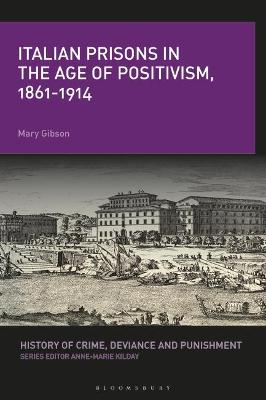
Italian Prisons in the Age of Positivism, 1861-1914
(Hardback)
Available Formats
Publishing Details
Italian Prisons in the Age of Positivism, 1861-1914
By (Author) Mary Gibson
Bloomsbury Publishing PLC
Bloomsbury Academic
11th July 2019
United Kingdom
Classifications
Tertiary Education
Non Fiction
History and Archaeology
Social and cultural history
Penology and punishment
365.94509034
Physical Properties
Hardback
336
Width 156mm, Height 234mm
653g
Description
During a period dominated by the biological determinism of Cesare Lombroso, Italy constructed a new prison system that sought to reconcile criminology with nation building and new definitions of citizenship. Italian Prisons in the Age of Positivism, 1861-1914 examines this "second wave" of global prison reform between Italian Unification and World War I, providing fascinating insights into the relationship between changing modes of punishment and the development of the modern Italian state. Mary Gibson focuses on the correlation between the birth of the prison and the establishment of a liberal government, showing how rehabilitation through work in humanitarian conditions played a key role in the development of a new secular national identity. She also highlights the importance of age and gender for constructing a nuanced chronology of the birth of the prison, demonstrating that whilst imprisonment emerged first as a punishment for women and children, they were often denied "negative" rights, such as equality in penal law and the right to a secular form of punishment. Employing a wealth of hitherto neglected primary sources, such as yearly prison statistics, this cutting-edge study also provides glimpses into the everyday life of inmates in both the new capital of Rome and the nation as a whole. Italian Prisons in the Age of Positivism, 1861-1914 is a vital study for understanding the birth of the prison in modern Italy and beyond.
Reviews
In this innovative and stimulating book Mary Gibson offers a very clear and attentive sketch of the evolution and transformation of the Italian penitentiary system during the half century between Italian Unification and the First World War. * Modern Italy *
Readers will find compelling her detailed descriptions of Roman prisons, depictions of inmates everyday lives, and compilations of prisoner profiles extrapolated from Interior Ministry statistics. Those interested in the urban history of Rome will welcome her analysis of local penal institutions as a critical part of the landscape and cultural fabric of the capital. English-language readers will benefit from her summaries of various dimensions of Italian prison history (e.g., deportation) well-established in Italian scholarship. * The Journal of Modern History *
Every chapter is packed with valuable information on a remarkable range of topics including the functioning of the Italian criminal justice system, national statistics on prisons and prisoners, church-state relations, the neighborhoods of Rome, the actions of notable socialist and feminist reformers, the international movement to protect children, and the history of psychiatry in Italy. * The American Historical Review *
Precisely thanks to the research results forwarded in the book and to its advocating an anti-diffusionist approach that pays due attention to the internal differentiation in the incarceration systems, it is now possible to consider the Italian contribution to a process of polygenesis of the modern prison in a new light. * Histoire sociale / Social History *
There is...much to recommend about Gibsons masterful account of a young Italys ongoing attempts to reform its penal system... [and it] offers a far more grounded account of the entanglement of nation-building and penal reform than any narrative invested in uncovering the birth of the prison. * Criminal Law and Criminal Justice Books *
A long-time specialist and leading scholar in both Italian and criminal justice history, Mary Gibson skilfully interweaves the story of Italian prisons with the country's politics and culture. Her long-term framework and global perspective enhance the appeal of this book. * Pieter Spierenburg, Emeritus Professor of History, Erasmus University, The Netherlands *
Mary Gibsons new book offers a fascinating, wide-ranging examination of the evolution of prisons in Italy. Theoretically sophisticated, and in various ways challenging Foucaults widely embraced scheme, Italian Prisons offers a clear road map through the twists and turns of the many theories of prisons developed in Italy and the ways in which these theories were translated into practice. Unusual in examining not only the course of mens penal systems but also those for women and juveniles, Italian Prisons sheds important new light on the birth of the modern prison. * David I. Kertzer, Professor of Anthropology and Italian Studies, Brown University, USA *
Mary Gibson has written the definitive book on the prison system established by Italy in the critical decades between unification and World War I. Clearly written and jargon-free, The Italian Prison in the Age of Positivism treats incarceration from the many different perspectives of theory, gender, administration, and the social history of the prisoners themselves. This book is strikingly original and based on meticulous research in multiple archival sources that are difficult to locate and access. The result is a nuanced, compelling, and beautifully argued work that is a pleasure to read. * Frank Snowden, Andrew Downey Orrick Professor of History & History of Medicine, Yale University, USA *
Author Bio
Mary Gibson is Professor Emerita of History at John Jay College and the Graduate Center, City University of New York, USA. She is the author of Born to Crime: Cesare Lombroso and the Origins of Biological Criminology (2002) and Prostitution and the State in Italy, 1860-1915 (2nd Edition, 1999).
